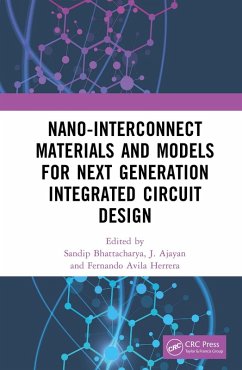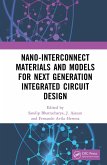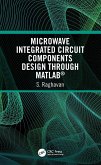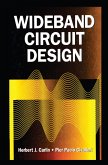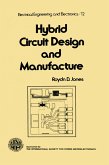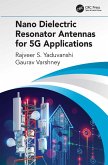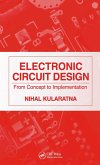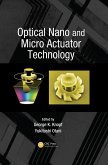Nano-Interconnect Materials and Models for Next Generation Integrated Circuit Design (eBook, PDF)
Redaktion: Bhattacharya, Sandip; Herrera, Fernando Avila; Ajayan, J.
51,95 €
51,95 €
inkl. MwSt.
Sofort per Download lieferbar

26 °P sammeln
51,95 €
Als Download kaufen

51,95 €
inkl. MwSt.
Sofort per Download lieferbar

26 °P sammeln
Jetzt verschenken
Alle Infos zum eBook verschenken
51,95 €
inkl. MwSt.
Sofort per Download lieferbar
Alle Infos zum eBook verschenken

26 °P sammeln
Nano-Interconnect Materials and Models for Next Generation Integrated Circuit Design (eBook, PDF)
Redaktion: Bhattacharya, Sandip; Herrera, Fernando Avila; Ajayan, J.
- Format: PDF
- Merkliste
- Auf die Merkliste
- Bewerten Bewerten
- Teilen
- Produkt teilen
- Produkterinnerung
- Produkterinnerung

Bitte loggen Sie sich zunächst in Ihr Kundenkonto ein oder registrieren Sie sich bei
bücher.de, um das eBook-Abo tolino select nutzen zu können.
Hier können Sie sich einloggen
Hier können Sie sich einloggen
Sie sind bereits eingeloggt. Klicken Sie auf 2. tolino select Abo, um fortzufahren.

Bitte loggen Sie sich zunächst in Ihr Kundenkonto ein oder registrieren Sie sich bei bücher.de, um das eBook-Abo tolino select nutzen zu können.
This book deals with various new generation interconnect materials for 3D integrated circuit design. It provides information about advanced nanomaterials like carbon nanotube (CNT) and graphene nanoribbon (GNR) for the realization of interconnects, interconnect models, and crosstalk noise analysis.
- Geräte: PC
- ohne Kopierschutz
- eBook Hilfe
- Größe: 20.73MB
Andere Kunden interessierten sich auch für
![Nano-Interconnect Materials and Models for Next Generation Integrated Circuit Design (eBook, ePUB) Nano-Interconnect Materials and Models for Next Generation Integrated Circuit Design (eBook, ePUB)]() Nano-Interconnect Materials and Models for Next Generation Integrated Circuit Design (eBook, ePUB)51,95 €
Nano-Interconnect Materials and Models for Next Generation Integrated Circuit Design (eBook, ePUB)51,95 €![Microwave Integrated Circuit Components Design through MATLAB® (eBook, PDF) Microwave Integrated Circuit Components Design through MATLAB® (eBook, PDF)]() S. RaghavanMicrowave Integrated Circuit Components Design through MATLAB® (eBook, PDF)40,95 €
S. RaghavanMicrowave Integrated Circuit Components Design through MATLAB® (eBook, PDF)40,95 €![Wideband Circuit Design (eBook, PDF) Wideband Circuit Design (eBook, PDF)]() Herbert J. CarlinWideband Circuit Design (eBook, PDF)182,95 €
Herbert J. CarlinWideband Circuit Design (eBook, PDF)182,95 €![Hybrid Circuit Design and Manufacture (eBook, PDF) Hybrid Circuit Design and Manufacture (eBook, PDF)]() Roydn D. JonesHybrid Circuit Design and Manufacture (eBook, PDF)51,95 €
Roydn D. JonesHybrid Circuit Design and Manufacture (eBook, PDF)51,95 €![Nano Dielectric Resonator Antennas for 5G Applications (eBook, PDF) Nano Dielectric Resonator Antennas for 5G Applications (eBook, PDF)]() Rajveer S. YaduvanshiNano Dielectric Resonator Antennas for 5G Applications (eBook, PDF)30,95 €
Rajveer S. YaduvanshiNano Dielectric Resonator Antennas for 5G Applications (eBook, PDF)30,95 €![Electronic Circuit Design (eBook, PDF) Electronic Circuit Design (eBook, PDF)]() Nihal KularatnaElectronic Circuit Design (eBook, PDF)63,95 €
Nihal KularatnaElectronic Circuit Design (eBook, PDF)63,95 €![Optical Nano and Micro Actuator Technology (eBook, PDF) Optical Nano and Micro Actuator Technology (eBook, PDF)]() Optical Nano and Micro Actuator Technology (eBook, PDF)198,95 €
Optical Nano and Micro Actuator Technology (eBook, PDF)198,95 €-
-
-
This book deals with various new generation interconnect materials for 3D integrated circuit design. It provides information about advanced nanomaterials like carbon nanotube (CNT) and graphene nanoribbon (GNR) for the realization of interconnects, interconnect models, and crosstalk noise analysis.
Dieser Download kann aus rechtlichen Gründen nur mit Rechnungsadresse in A, B, BG, CY, CZ, D, DK, EW, E, FIN, F, GR, HR, H, IRL, I, LT, L, LR, M, NL, PL, P, R, S, SLO, SK ausgeliefert werden.
Produktdetails
- Produktdetails
- Verlag: Taylor & Francis
- Seitenzahl: 222
- Erscheinungstermin: 22. Dezember 2023
- Englisch
- ISBN-13: 9781003817062
- Artikelnr.: 69448333
- Verlag: Taylor & Francis
- Seitenzahl: 222
- Erscheinungstermin: 22. Dezember 2023
- Englisch
- ISBN-13: 9781003817062
- Artikelnr.: 69448333
Sandip Bhattacharya received his Ph.D. (Eng.) degree from the Indian Institute of Engineering Science and Technology (IIEST), India, in 2017. From October 2017 to December 2020, he worked as a postdoctoral researcher at the HiSIM research center, Hiroshima University, Japan. He is currently working as an Associate Professor and Head of the Department of Electronics and Communication Engineering at SR University, Warangal, Telangana, India. His current research interests are nano device and interconnect modeling. J. Ajayan received his B.Tech. degree in Electronics and Communication Engineering from Kerala University in 2009, and M.Tech. and Ph.D. degrees in Electronics and Communication Engineering from Karunya University, Coimbatore, India, in 2012 and 2017, respectively. He is an Associate Professor in the Department of Electronics and Communication Engineering at SR University, Telangana, India. He has published more than 100 research articles in various journals and international conferences. He has published two books, more than ten book chapters, and has two patents. He is a reviewer of more than 30 journals for various publishers. He was the Guest Editor for several of the special issues. His areas of interest are microelectronics, semiconductor devices, nanotechnology, RF integrated circuits, and photovoltaics. Fernando Avila Herrera has worked in the field of academic and semiconductor industry. He has involved with the modeling and characterization of semiconductor devices, especially MOSFETs. Further, he has experience in device reliability modeling, model parameter extraction, Verilog-A, TCAD, and EDA tools. He also has experience in HiSIM family models for parameter extraction and physics modeling and FPGA programming. He has collaborated with different groups for developing compact models.
1 Nanomaterials for Next-Generation Interconnects
2 Interconnect Modeling Using Graphene Nanoribbon (GNR)
3 Introduction to Nanoscale Interconnect Materials
4 Analysis of Simultaneous Switching Noise and IR Drop
5 Temperature-Dependent RF Performance Analysis of GNR-Based
Nano-Interconnect Systems
6 Electro-Thermal Modeling of CNT and GNR Interconnect for Nano-Electronic
Circuits
7 Hybrid Cu-Carbon as Interconnect Materials and Their Interconnect Models
8 Hybrid Cu-CNT Composite as Interconnect Materials and Their Equivalent
Models
9 Relative Stability Analysis of the GNR and Cu Interconnect
10 Transmission Line-Based Modeling of CNT and GNR Interconnects Using
Numerical Methods
2 Interconnect Modeling Using Graphene Nanoribbon (GNR)
3 Introduction to Nanoscale Interconnect Materials
4 Analysis of Simultaneous Switching Noise and IR Drop
5 Temperature-Dependent RF Performance Analysis of GNR-Based
Nano-Interconnect Systems
6 Electro-Thermal Modeling of CNT and GNR Interconnect for Nano-Electronic
Circuits
7 Hybrid Cu-Carbon as Interconnect Materials and Their Interconnect Models
8 Hybrid Cu-CNT Composite as Interconnect Materials and Their Equivalent
Models
9 Relative Stability Analysis of the GNR and Cu Interconnect
10 Transmission Line-Based Modeling of CNT and GNR Interconnects Using
Numerical Methods
1 Nanomaterials for Next-Generation Interconnects
2 Interconnect Modeling Using Graphene Nanoribbon (GNR)
3 Introduction to Nanoscale Interconnect Materials
4 Analysis of Simultaneous Switching Noise and IR Drop
5 Temperature-Dependent RF Performance Analysis of GNR-Based
Nano-Interconnect Systems
6 Electro-Thermal Modeling of CNT and GNR Interconnect for Nano-Electronic
Circuits
7 Hybrid Cu-Carbon as Interconnect Materials and Their Interconnect Models
8 Hybrid Cu-CNT Composite as Interconnect Materials and Their Equivalent
Models
9 Relative Stability Analysis of the GNR and Cu Interconnect
10 Transmission Line-Based Modeling of CNT and GNR Interconnects Using
Numerical Methods
2 Interconnect Modeling Using Graphene Nanoribbon (GNR)
3 Introduction to Nanoscale Interconnect Materials
4 Analysis of Simultaneous Switching Noise and IR Drop
5 Temperature-Dependent RF Performance Analysis of GNR-Based
Nano-Interconnect Systems
6 Electro-Thermal Modeling of CNT and GNR Interconnect for Nano-Electronic
Circuits
7 Hybrid Cu-Carbon as Interconnect Materials and Their Interconnect Models
8 Hybrid Cu-CNT Composite as Interconnect Materials and Their Equivalent
Models
9 Relative Stability Analysis of the GNR and Cu Interconnect
10 Transmission Line-Based Modeling of CNT and GNR Interconnects Using
Numerical Methods
